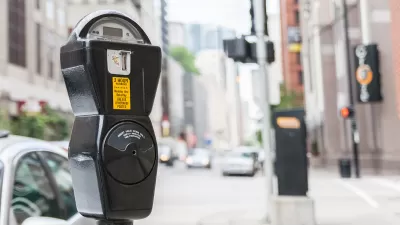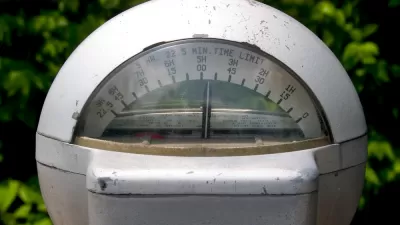Contrary to many motorists' fears, San Francisco's demand-based parking pricing has reduced overall average hourly rates and ticket citations.
When San Francisco first installed its SFpark meters — devices that would increase hourly parking rates based on demand — many motorists complained that it was one more way to gouge drivers for extra dollars. In fact, the program has done the exact opposite, reports .
"Since taking effect in April 2011, average hourly rates have dropped by 14 cents from $2.73 to $2.59 at the 7,000 SFpark meters. Overall, 17 percent of those meters offer hourly rates of $1 or less — prices that are significantly cheaper than the ones offered at the 22,000 older meters. And 6 percent of SFpark meters go for as cheap as 25 cents an hour, according to data from the San Francisco Municipal Transportation Agency, which oversees parking policies in The City. The drop in prices for on-street parking meters coincides with a 20 percent rate decrease in SFMTA-run garages.
"Donald Shoup, a UCLA professor whose theories on parking were instrumental in developing the SFpark program, said he expected prices at meters to rise in the first year, given the demand for spaces in San Francisco. He said the drop in meter rates is proof that the agency is concerned about responsible parking management and not price-gouging policies. 'I don’t understand how anyone can keep parroting that this is a money grab,' Shoup said."
"Because the SFpark meters provide more payment options for motorists, ticket citations have decreased," adds Reisman.
FULL STORY: SFpark hourly meters actually saves motorists money

Maui's Vacation Rental Debate Turns Ugly
Verbal attacks, misinformation campaigns and fistfights plague a high-stakes debate to convert thousands of vacation rentals into long-term housing.

Planetizen Federal Action Tracker
A weekly monitor of how Trump’s orders and actions are impacting planners and planning in America.

Chicago’s Ghost Rails
Just beneath the surface of the modern city lie the remnants of its expansive early 20th-century streetcar system.

Bend, Oregon Zoning Reforms Prioritize Small-Scale Housing
The city altered its zoning code to allow multi-family housing and eliminated parking mandates citywide.

Amtrak Cutting Jobs, Funding to High-Speed Rail
The agency plans to cut 10 percent of its workforce and has confirmed it will not fund new high-speed rail projects.

LA Denies Basic Services to Unhoused Residents
The city has repeatedly failed to respond to requests for trash pickup at encampment sites, and eliminated a program that provided mobile showers and toilets.
Urban Design for Planners 1: Software Tools
This six-course series explores essential urban design concepts using open source software and equips planners with the tools they need to participate fully in the urban design process.
Planning for Universal Design
Learn the tools for implementing Universal Design in planning regulations.
planning NEXT
Appalachian Highlands Housing Partners
Mpact (founded as Rail~Volution)
City of Camden Redevelopment Agency
City of Astoria
City of Portland
City of Laramie





























